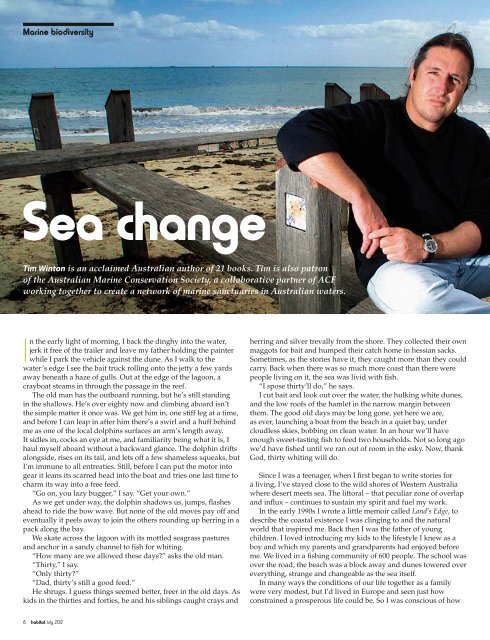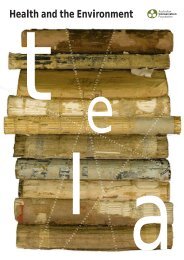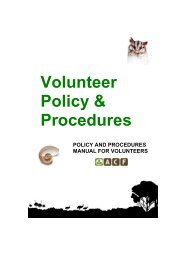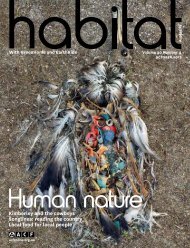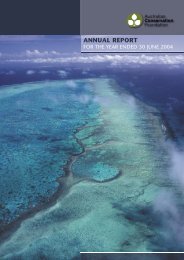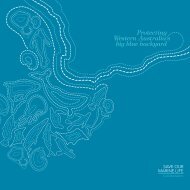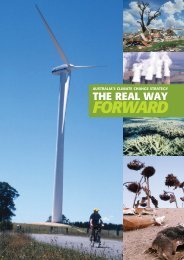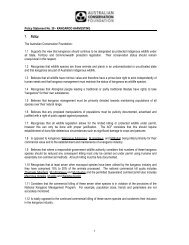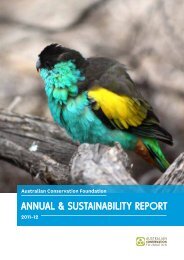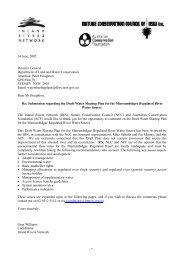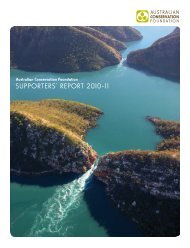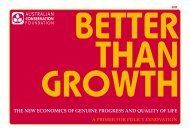habitat July 2012 - Australian Conservation Foundation
habitat July 2012 - Australian Conservation Foundation
habitat July 2012 - Australian Conservation Foundation
Create successful ePaper yourself
Turn your PDF publications into a flip-book with our unique Google optimized e-Paper software.
Marine biodiversity<br />
Sea change<br />
Tim Winton is an acclaimed <strong>Australian</strong> author of 21 books. Tim is also patron<br />
of the <strong>Australian</strong> Marine <strong>Conservation</strong> Society, a collaborative partner of ACF<br />
working together to create a network of marine sanctuaries in <strong>Australian</strong> waters.<br />
In the early light of morning, I back the dinghy into the water,<br />
jerk it free of the trailer and leave my father holding the painter<br />
while I park the vehicle against the dune. As I walk to the<br />
water’s edge I see the bait truck rolling onto the jetty a few yards<br />
away beneath a haze of gulls. Out at the edge of the lagoon, a<br />
crayboat steams in through the passage in the reef.<br />
The old man has the outboard running, but he’s still standing<br />
in the shallows. He’s over eighty now and climbing aboard isn’t<br />
the simple matter it once was. We get him in, one stiff leg at a time,<br />
and before I can leap in after him there’s a swirl and a huff behind<br />
me as one of the local dolphins surfaces an arm’s length away.<br />
It sidles in, cocks an eye at me, and familiarity being what it is, I<br />
haul myself aboard without a backward glance. The dolphin drifts<br />
alongside, rises on its tail, and lets off a few shameless squeaks, but<br />
I’m immune to all entreaties. Still, before I can put the motor into<br />
gear it leans its scarred head into the boat and tries one last time to<br />
charm its way into a free feed.<br />
“Go on, you lazy bugger,” I say. “Get your own.”<br />
As we get under way, the dolphin shadows us, jumps, flashes<br />
ahead to ride the bow wave. But none of the old moves pay off and<br />
eventually it peels away to join the others rounding up herring in a<br />
pack along the bay.<br />
We skate across the lagoon with its mottled seagrass pastures<br />
and anchor in a sandy channel to fish for whiting.<br />
“How many are we allowed these days?” asks the old man.<br />
“Thirty,” I say.<br />
“Only thirty?”<br />
“Dad, thirty’s still a good feed.”<br />
He shrugs. I guess things seemed better, freer in the old days. As<br />
kids in the thirties and forties, he and his siblings caught crays and<br />
herring and silver trevally from the shore. They collected their own<br />
maggots for bait and humped their catch home in hessian sacks.<br />
Sometimes, as the stories have it, they caught more than they could<br />
carry. Back when there was so much more coast than there were<br />
people living on it, the sea was livid with fish.<br />
“I spose thirty’ll do,” he says.<br />
I cut bait and look out over the water, the hulking white dunes,<br />
and the low roofs of the hamlet in the narrow margin between<br />
them. The good old days may be long gone, yet here we are,<br />
as ever, launching a boat from the beach in a quiet bay, under<br />
cloudless skies, bobbing on clean water. In an hour we’ll have<br />
enough sweet-tasting fish to feed two households. Not so long ago<br />
we’d have fished until we ran out of room in the esky. Now, thank<br />
God, thirty whiting will do.<br />
Since I was a teenager, when I first began to write stories for<br />
a living, I’ve stayed close to the wild shores of Western Australia<br />
where desert meets sea. The littoral – that peculiar zone of overlap<br />
and influx – continues to sustain my spirit and fuel my work.<br />
In the early 1990s I wrote a little memoir called Land’s Edge, to<br />
describe the coastal existence I was clinging to and the natural<br />
world that inspired me. Back then I was the father of young<br />
children. I loved introducing my kids to the lifestyle I knew as a<br />
boy and which my parents and grandparents had enjoyed before<br />
me. We lived in a fishing community of 600 people. The school was<br />
over the road, the beach was a block away and dunes towered over<br />
everything, strange and changeable as the sea itself.<br />
In many ways the conditions of our life together as a family<br />
were very modest, but I’d lived in Europe and seen just how<br />
constrained a prosperous life could be. So I was conscious of how<br />
6 <strong>habitat</strong> <strong>July</strong> <strong>2012</strong>


